Publications
When there are new challenges to rise up to, KAIST CAF will be at the very forefront.
Publications
Total : 59
-
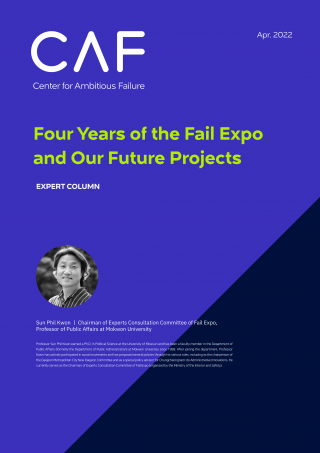 Expert ColumnFour Years of the Fail Expo and Our Future Projects
Expert ColumnFour Years of the Fail Expo and Our Future Projects2022-04-13
Sun Phil Kwon
Korea will see a new administration come to power in May. The Center for Ambitious Failure (CAF) asked experts in R&D, entrepreneurship, management, and public policy about why it is important to reexamine failures in their respective fields and how we can make policy changes to ensure that our failures become a valuable asset for building a better future. This is a column written by Professor Sun Phil Kwon of Mokwon University's division of Public Affairs. He analyzes the Fail Expo's achievements and limitations as a government program and then proposes a future initiative for implementing social learning processes for failure. "It is imperative that we continuously improve upon the Fail Expo as a government policy. The process of implementing a social learning approach to failure and building a culture where failure is considered an asset should also apply to the perspective of ‘the Fail Expo as a policy.’ There are several reasons as to why the Fail Expo has not managed to reach its full potential: 1) we lack a proper understanding of the perception of failure in our culture, 2) the analysis structures and tools that provide us with a comprehensive understanding of failure are lacking, and 3) there is a lack of cooperation between the various players involved in the process of overcoming failure. In addition to these macroscopic limitations, a more fundamental issue lies in how we segment the process of solving problems related to failure. I believe that a key element of solving the complexity of failure concerns how we set the granularity when it comes to failure phenomenon."
Origin
Download -
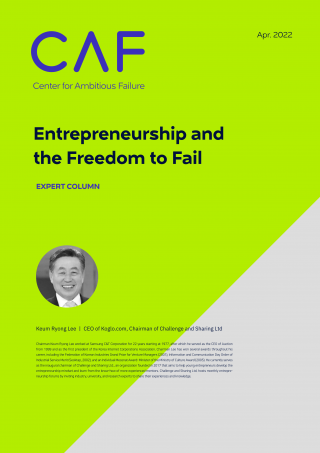 Expert ColumnEntrepreneurship and the Freedom to Fail
Expert ColumnEntrepreneurship and the Freedom to Fail2022-04-13
Keum Ryong Lee
Korea will see a new administration come to power in May. The Center for Ambitious Failure (CAF) asked experts in R&D, entrepreneurship, management, and public policy about why it is important to reexamine failures in their respective fields and how we can make policy changes to ensure that our failures become a valuable asset for building a better future. Here is a column by Chairman Keum Ryong Lee of Challenge and Sharing Ltd. in which he advocates for the government to play a better role in allowing entrepreneurs to try and fail. "We are at an important turning point in the technological revolution, and thus the new government should move away from a positive system and adopt a negative system through bold reforms. Furthermore, the government should remove the licensing rights held by public officials and actively strive to abolish new industry regulations that, despite seeming on the surface to benefit the disadvantaged, do little outside of further empowering established interest groups to resist change. If new companies are unable to spread their wings and take on new challenges due to the restrictions in place by the current outdated regulations, Korea will be facing dark times ahead. Just like how President-elect Yoon took nine attempts to pass the Korean bar exam, venture companies now consider failure as an asset and are armed with the entrepreneurship mindset to take on challenges. During last year’s Challenge and Sharing seminar, Toss Bank CEO Seunggun Lee described how he failed eight times before founding Toss on his ninth attempt, but in the process, he learned many value lessons. Even Silicon Valley companies that make it onto the NASDAQ fail an average of 3.03 times."
Origin
Download -
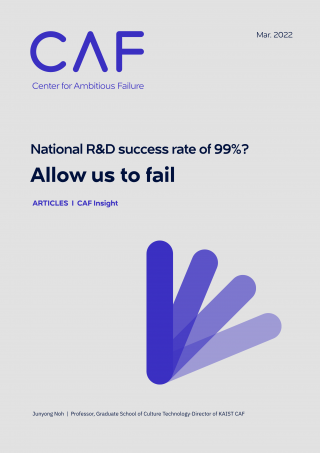 CAF InsightNational R&D success rate of 99%? Allow us to fail
CAF InsightNational R&D success rate of 99%? Allow us to fail2022-03-17
Junyong Noh
“Failure is a common phenomenon that occurs frequently around us. Instead of denouncing results that look like failure and putting an end to it all with a period, we should instead take a pause by placing a comma instead and consider these hurdles as part of the process to succeed. For Korea to make major strides toward becoming a leading nation in the world, it will be vital that our society becomes more tolerant to the idea of failure.” This article was published in the opinion column of Korea JoongAng Daily on February 28th, 2022. https://www.joongang.co.kr/article/25051629#home
Origin
Download -
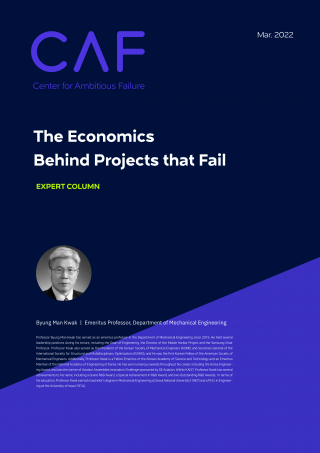 Expert ColumnThe Economics Behind Projects that Fail
Expert ColumnThe Economics Behind Projects that Fail2022-03-17
Byung Man Kwak
"I propose that we create a separate category titled “big impact projects” that includes a select group of important projects (involving security, environment, energy, welfare, etc.) with the potential to significantly impact the daily lives of citizens as well as the national economy. These projects could result in major successes like public or corporate projects. From the perspective of “the economics behind projects that fail,” which considers the potential for even greater benefits resulting from projects that appear to be heading toward failure, I propose the following regarding big impact projects." Byung Man Kwak ᅵ Emeritus Professor, Department of Mechanical Engineering Professor Byung Man Kwak has served as an emeritus professor in the Department of Mechanical Engineering since 2015. He held several leadership positions during his tenure, including the Dean of Engineering, the Director of the Mobile Harbor Project and the Samsung Chair Professor. Professor Kwak also served as the President of the Korean Society of Mechanical Engineers (KSME) and Secretary General of the International Society for Structural and Multidisciplinary Optimization (ISSMO), and he was the first Korean Fellow of the American Society of Mechanical Engineers. Additionally, Professor Kwak is a Fellow Emeritus of the Korean Academy of Science and Technology and an Emeritus Member of the National Academy of Engineering of Korea. He has won numerous awards throughout his career, including the Korea Engineering Award, and was the winner of Aviation Assemblies Innovation Challenge sponsored by GE Aviation. Within KAIST, Professor Kwak has several achievements to his name, including a Grand R&D Award, a Special Achievement in R&D Award, and two Outstanding R&D Awards. In terms of his education, Professor Kwak earned a bachelor’s degree in Mechanical Engineering at Seoul National University (1967) and a Ph.D. in Engineering at the University of Iowa (1
Origin
Download -
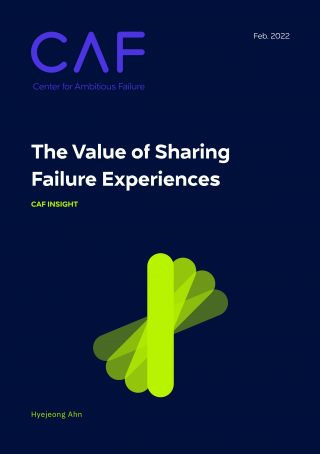 CAF InsightThe Value of Sharing Failure Experiences
CAF InsightThe Value of Sharing Failure Experiences2022-03-16
Hyejeong Ahn
In a society that values success, failure is often viewed as something that needs to be kept out of sight. However, there has been a movement in several fields that necessitate innovative and creative approaches to ‘shed light onto and share failures.’ This article will introduce various cases that have led the ‘sharing failure experiences’ movement and explore the meaning and impact of sharing experiences involving one’s failure to others Cases - FailCon (Fail Conference) - F*-up Nights - International Day for Failure - Fail Expo
Origin
Download -
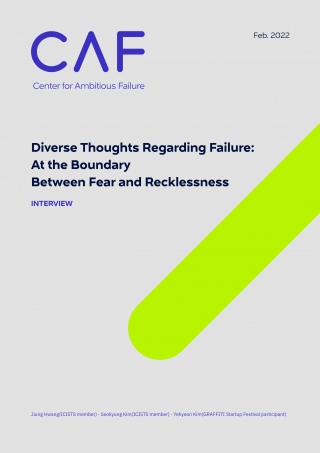 KAISTian StoryDivers Thoughts Regarding Failure : At the Boundary Between Fear and Recklessness
KAISTian StoryDivers Thoughts Regarding Failure : At the Boundary Between Fear and Recklessness2022-02-24
Jiung Hwang· Seokyung Kim· Yehyeon Kim / Interviewer : Hyejeong Ahn
We held a group interview with two of the organizers of the Failcon session of the GRAFFITI Startup Festival as well as a participant of the event to ask them about their thoughts on the festival and their perspectives regarding failure. We asked the organizers why they decided to choose the subject of ‘failure’ as the theme of the festival, and all interviewees were asked about how they defined failure and what they learned about failure by listening to other people’s failure stories. Let us hear from three students who would have pondered deeply about the concept of failure. [Interviewees] - Jiung Hwang : KAIST undergraduate student ICISTS member, main organizer of Failcon - Seokyung Kim : KAIST undergraduate student ICISTS member - Yehyeon Kim : KAIST undergraduate student GRAFFITI Startup Festival participant * This interview was conducted online via a group Zoom conference on January 26th, 2022.
Origin
Download -
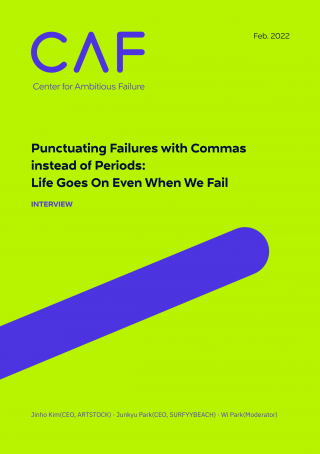 KAISTian StoryPunctuating Failures with Commas instead of Periods: Life Goes On Even When We Fail
KAISTian StoryPunctuating Failures with Commas instead of Periods: Life Goes On Even When We Fail2022-02-24
Panel : Jinho Kim · Junkyu Park · Wi Park / Reporter : Hyejeong Ahn
The final session of the GRAFFITI Startup Festival organized by the KAIST undergraduate student club ICISTS was Failcon, which focused on sharing various stories of involving failure. The festival kicked off with a panel talk with KAIST alumni who went on to start their own companies. Here, the CEOs were given an opportunity to share their own failure experiences as well as their thoughts on failure. The invited panelists were ARTSTOCK CEO Jinho Kim (who was also a key figure in the first-generation venture company Gold Bank) and SURFYYBEACH CEO Junkyu Park (who helped transform Yangyang-gun, Gangwon-do into the go-to place for young surfers). The panel was moderated by Wi Park, the content creator behind the YouTube channel WERACLE. This article summarizes the failure stories shared during the panel. Panel - Jinho Kim(CEO, ARTSTOCK) - Junkyu Park(CEO, SURFYYBEACH) - Wi Park(Moderator)
Origin
Download -
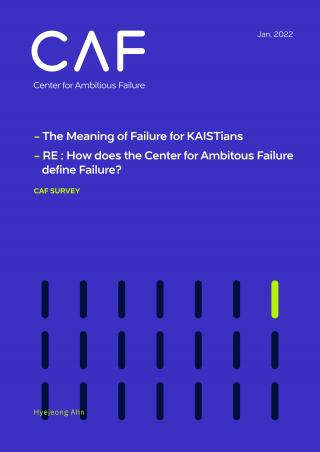 CAF Insight(Special Survey) The Meaning of Failure for KAISTians
CAF Insight(Special Survey) The Meaning of Failure for KAISTians2022-02-24
Hyejeong Ahn
The problem-solving process begins by defining the problem. To cement the role and scope of the Center for Ambitious Failure (CAF) as a research center aiming to bring changes to the culture of KAIST, we decided that a good way to get started is to explore the shared perceptions of KAISTians regarding what is considered as a failure and the frame through which failure is viewed. For this reason, CAF conducted a survey titled “What Does Failure Mean to You?” with all members of KAIST. This survey was conducted on December 8th~21st, 2021, and we received responses from a total of 735 members (185 undergraduate students, 386 graduate students, 55 faculty members, 103 employees, and 6 other members). In addition to sharing their thoughts on failure, many respondents sent their opinions regarding the role of CAF. This report provides an overall analysis of the submitted responses.
Origin
Download -
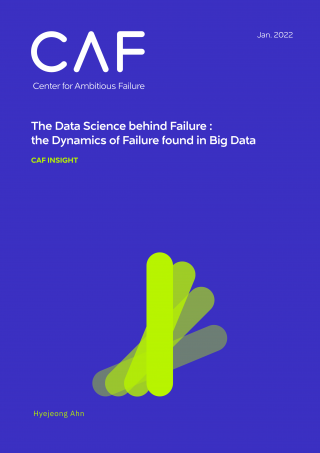 CAF InsightThe Data Science behind Failure : the Dynamics of Failure found in Big Data
CAF InsightThe Data Science behind Failure : the Dynamics of Failure found in Big Data2022-02-24
Hyejeong Ahn
Is failure truly the mother of success? We often hear famous quotes about how ‘failure is a key part of the process toward success,’ but beyond personal anecdotes, evidence or scientific research that objectively describe the relationship between failure and success are surprisingly scarce. This report presents studies that aimed to scientifically analyze the dynamics of failure and success with big data obtained from examples in academia, entrepreneurship, and even attempts of terrorism. By delving into two studies published by Professor Dashun Wang’s research team at the Northwestern University Center for Science of Science & Innovation (CSSI), we examined how the dynamics of failure according to big data resemble or deviate from conventional wisdom.
Origin
Download

